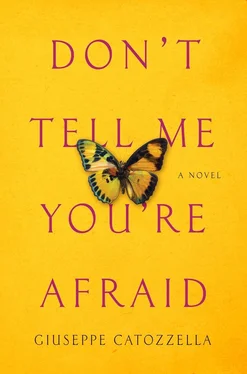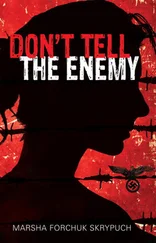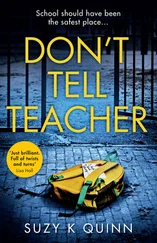“Complaining only makes you keep doing what you don’t like,” Aabe answered in his deep voice, as he ran a hand through his flowing black hair. He had always worn his hair long. Hooyo teased him, saying he acted like a woman and that’s why he didn’t have a beard either. “Beards are for fundamentalists,” he would tell her. “If you really don’t like something, you just need to change it, my little Samia. I love my work, and I love it because I do it for you. This makes me happy.”
I stopped to think a little, then asked him: “Papa, aren’t you ever afraid of the war?”
He turned serious. “You must never say you’re afraid, my Samia. Never. Otherwise the things you’re afraid of will seem big and they’ll think they can beat you.”
That morning he and Yassin left together, as always. They had just crossed Jamaral Daud, right beyond the parliament, and had stopped at their friend Taageere’s bar, a wooden shack in a small alley, to drink a shaat and shoot the breeze before work, as they did every day.
Suddenly, however, they heard gunshots.
A hundred yards away, from behind a six-story building, four or five Hawiye militiamen, affiliated with us Abgal, had appeared. They were looking for a Darod who, according to them, had stolen something, and they were shouting that he must have fled in that direction.
One of them spotted Yassin standing with Aabe in front of the bar and pointed him out to the others, and they all started running toward him.
Aabe and Yassin didn’t even have time to think.
When the soldiers came closer, Alì’s father realized what was about to happen and instinctively started to run away.
It all happened in an instant.
As soon as Yassin turned his back, one of the men opened fire, followed immediately by the others.
Aabe lunged to knock Yassin to the ground, clear of the barrage of bullets that had already riddled the wall a few inches from there.
Later they told us that Taageere stood there the whole time as if frozen, the two glasses of shaat in his hands, poised in midair.
Meanwhile, the gunfire was over as quickly as it had erupted.
The soldiers shouted something and, satisfied, disappeared around the corner as swiftly as they had materialized.
Aabe and Yassin turned, relieved, thinking they had come through it safely.
But when they tried to get up, they realized what had happened. Taageere was white as a sheet.
Aabe had been shot in his right foot.
He hadn’t even been aware of it.
The blood had already formed a small pool.
Friendly fire had struck an Abgal in place of a Darod.
• • •
HODAN COMPOSED HER SONGS and then sang them.
She had a beautiful voice, like velvet. It was a little husky and low but at the same time clear enough to reach the highest notes. When she sang, her smooth, round, porcelain-doll face wore an astonished expression, as if she were always about to reveal something. I adored her. I wanted to be like her, to have her beauty, her voice. Besides that, the veils never looked as good on any other girl as they did on Hodan. The bright colors, yellow, red, and orange, lit up her face like a sudden blaze in a dense forest.
To mark the rhythm she would join her palms and tap her fingers together, like a shell in the Indian Ocean that continuously opens and shuts, following a steady tempo.
She sang in the traditional buraanbur form, though blended with more modern music, in the style of her musical group, the Shamsudiin Band.
She composed her songs in our room, alone, or while we kids were in bed, with the ferus lit, waiting to fall asleep, enjoying the last laughs of the day.
At some point, every night, Hodan withdrew, pulled out her little notebook, and began writing. She wrote about all kinds of subjects, about what made her suffer and about what gave her joy.
I watched her closely, studying her smallest gestures. She and I, in fact, had always slept next to each other, ever since I was born, when she had just turned five. Our mattresses were placed at right angles along the side of the room nearest the door, just inside the entrance. And since birth I’d gotten used to falling asleep with her voice in my ears, growing slowly softer and softer, until fading off into a whisper.
Maybe that’s why I always slept well and why, as everyone said, I was confident about what would happen tomorrow, thinking it would be better than today. It was because of Hodan’s voice, which had accompanied me to sleep since I was born.
“I’ve given all my optimism to you,” she’d tell me.
Unlike me, Hodan was always worried; she always had something on her mind. She found peace only in the evening, when the ferus was turned off and she could go on whispering her songs about the war, about our family, about the future, about running, about Alì, about our father being shot, about the children we would one day have.
We always fell asleep hand in hand, our heads touching. As I held her hand, I felt her grip gradually loosen and become more gentle. And I realized that she relaxed as she sang.
I knew I was her first audience, and it filled me with pride. I felt she gauged her songs by my smiles; though the themes varied widely, they all spoke of one thing: the importance of freedom and the power of dreams.
On the night Aabe was injured, while he was in the hospital recovering from surgery, Hodan composed a song that compared him to a great winged horse.
She sang it in the middle of the room, sitting cross-legged on my brother Abdi’s mattress.
Hooyo was with us too; they hadn’t let her sleep at the hospital. The beds couldn’t be occupied by relatives, since sick people or those wounded by mortars or gunfire were continually coming in. Small and composed, Hooyo sat on my sister Ubah’s mattress, right in front of me, her feet flat on the ground, not cross-legged like us. Head in hands, her eyes were fixed on Hodan. She was lost in thought; her gaze drifted here and there.
Ubah had lit incense, and the strong, sweet odor filled the small room. The song said that our father would continue to fly as he had done up to that day, and that, flying, he would ferry us into adulthood. That his arms were as vigorous as the wings of a huge bird and his legs as sturdy as the trunks of ancient trees.
For some reason, what I’ve always remembered about that night was the tears that silently filled our big brother Said’s eyes as he stared impassively ahead of him.
I got up and went over on tiptoe to wipe them for him.

FROM THE DAY he was wounded, it was clear that Aabe would no longer be able to go to work. He had lost the use of his foot, of which little more than a stump remained. From now on, he would have to lean on a stick to walk.
He would no longer be able to pull the cart with the clothes. His future would be the house, the courtyard.
After a lifetime spent together, day after day, Yassin would get up alone and by himself walk an hour to reach the Xamar Weyne market.
The first days were tough.
Aabe had withdrawn into a silence full of suppressed anger. Every so often, in the countless hours spent sitting in the wicker chair in the courtyard, he’d be seized with rage and would hurl his stick with all his might, as if it were a javelin. It would strike the wall and end up on the ground, too far away to reach. Until Hooyo recovered it for him.
In those awful days Aabe was always mute, mortified, and inert. It was impossible to talk to him; he chased us away; he even chased me away, his darling little girl.
Only once did he come out with words that made Hooyo’s tears flow. “I’m a useless object, incapable of moving, like a car without wheels.”
Читать дальше





![Ally Carter - [Gallagher Girls 01] I'd Tell You I Love You But Then I'd Have to Kill You](/books/262179/ally-carter-gallagher-girls-01-i-d-tell-you-i-lo-thumb.webp)







